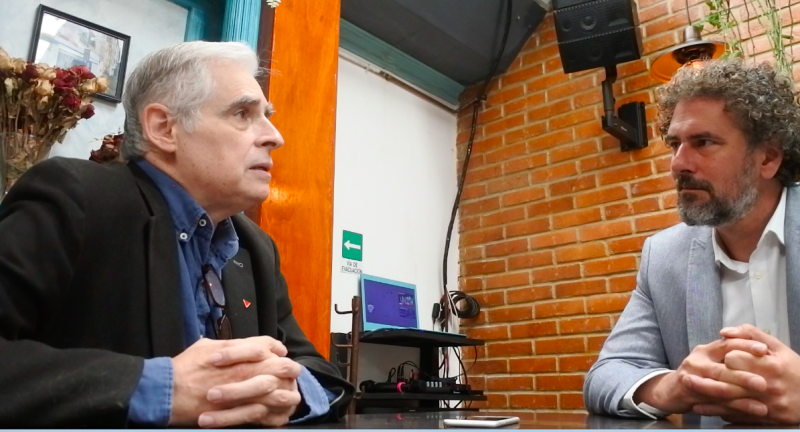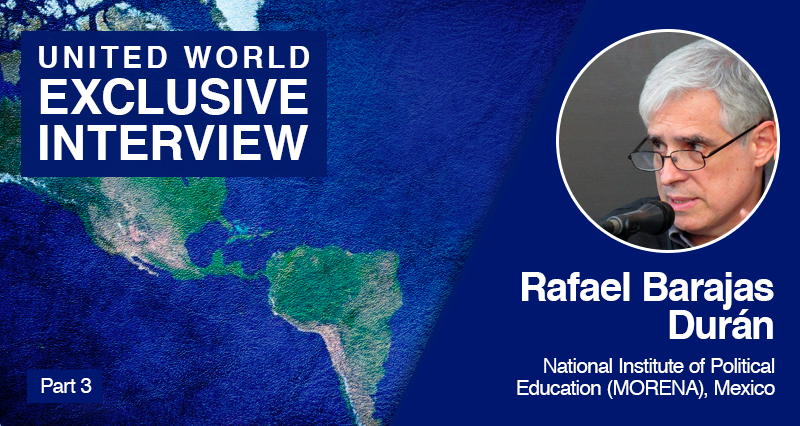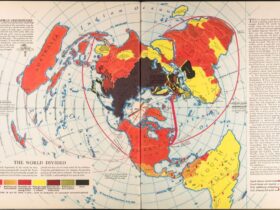Both are United States: In the south are the United Mexican States, as the state of Mexico is officially named. In the north are the United States of America. On their relationship focused the third and final part of our interview with Rafael Barajas Durán.
As a reminder: Barajas is President of the National Institute of Political Education, which is officially affiliated to Mexico’s ruling MORENA party. In his function as President for the political education of Mexicans, Barajas also frequently travelled to the United States of America to contact Mexican immigrants living there.
Their views on Mexican and U.S. politics constitutes the first topic, including – of course their stance regarding the presidential elections in both countries in 2024.
The second topic is a proposal of Mexico’s President López Obrador to establish an economic and political union covering the entire American continent from the south to the north. What is the proposal’s background? Is there not a contradiction between that idea and the goal of defending the nation-state, a goal that Barajas had postulated in the second part of the interview as the main idea behind the Fourth Transformation MORENA is struggling for?
You travelled several times to the United States of America and dialogued with the Mexicans living there. How do they see the Fourth Transformation taking place in Mexico? And how do they see the domestic situation in the United States of America?
Mexicans in the U.S., at least those I have talked to, see the Fourth Transformation in Mexico with great hope. They think, and I agree, that here’s government they consider their own. They are very exited and they act: they reestablish contacts, they begin to invest in their communities, because they know here’s a government that will not rob their investment.
“Mexicans in the U.S. see the Fourth Transformation with great hope”
U.S. domestic politics is a much more delicate matter, because the politics there is very fragmented. It changes from state to state and from candidate to candidate.
Immigrants are naturally focused on issues of immigration policy, documentation, legalization etc. What is new is that they start to perceive themselves as an increasingly important political actor in the United States. And that might make a difference in the middle term.
That’s a question I had in mind.
That’s a question we all have in mind. Our job as the Institute of Political Education is also to provide political education to MORENA’s supporters in the United States. This is an important job.
We want that they understand what we are doing here in Mexico. It is their decision if afterwards they want to start becoming politically active in the United States. And well, is a population of 12 million Mexicans of first generation in the U.S. not an important political force?
But our primary intention is to provide them political education regarding Mexico. They are Mexicans living in the U.S. and they continue to be a part of ours.

Presidential elections will take in the United States in 2024. What is your recommendation to Mexicans?
We will not interfere into the US’ domestic matters, because we also do not want the North Americans to interfere into ours.
But the North Americans are already interfering into domestic Mexican politics.
Yes, but we will not interfere into their politics. The citizens their will decide what to do in the elections.
You will not even propose them criteria on which to decide their vote upon?
Now, at this moment, we do not propose them criteria for electoral decision.
“Now, at this moment”?
Not now and not in the future: We do not have the perspective to propose them anything concerning domestic U.S. politics.
If you compare Trump and Biden…
This question is a trap. Departing from my evaluation, you want to conclude what we would propose to Mexicans living in the U.S…
Leaving that aside, as a Mexican citizen living in Mexico City, I guess you have a preference.
Of course, but I keep that opinion to myself. First of all, we are not at all sure that these two will be candidates in the elections. Secondly, here in Mexico, we made very bad experiences with both political parties, the Democrats and the Republicans alike. Therefore, I keep my opinion to myself.
And what is your opinion in regards to the elections in Mexico in 2024?
All the polls show that MORENA is leading by a great advantage. Besides, there is a serious crack in the oppositional block, which has been established mainly by business circles. They present very few alternatives in politics.
In addition, López Obrador has great support among popular masses. Therefore, it is foreseeable that MORENA is going to win the elections.
There “will be destabilization” ahead of Mexican election in 2024
Do you fear a destabilization campaign ahead of the elections?
Oh, yes, of course. This is a permanent campaign, we are always threatened by it. This is a fact. And I also fear that there is electoral fraud, which is endemic in our country, and I also fear there is intervention by external interest groups. This is daily life in Mexico. This is to be expected. This will happen.
Turning to Mexican – U.S. relations on state level. You told before that all progressive movements in Latin America seek to save the nation-state. Is it possible to save the nation-state by uniting with the U.S.?
By building an alliance with the United States? Of course. This is the proposal of President López Obrador in his Bolivarian Speech. This is a very interesting proposal.
The idea is to establish a political and above all, economical alliance on continental level to respond to the very strong global challenges. But this proposal of course includes a profound change.
Would such an alliance not deepen Mexico’s dependency from the U.S. economy, offering Washington even more chances for political intervention?
Well, that depends on how you negotiate such a treaty. I think that the unipolar world emerged in the 1980s has already entered a severe crisis. The United States is not anymore the only economically important actor in the world. There are other strong economies that check the North American one. This is what is at the roots of the current conflict.
Is the Mexican government seeking to be the New China, attracting investments that the U.S. withdraws from there? Making use of the so-called wave of ‘near shoring’?
No, what we seek is to be the New Mexico, which is very different. We do not seek to compete with China to attract investments. In fact, we already do have the advantage of geographical proximity to the U.S. Therefore, we do not need compete in that.
Actually, these are at the end political decisions. The U.S. has had of course economic reasons to invest in China as well, but that trend was mainly based on a political and strategic decision.
López Obrador proposes between the U.S. and Latin America “relations of equals”
It is really important to study carefully that speech of President López Obrador. He draws a balance of how the relations between the United States and Latin America have been. And he offers the United States a political and historic way out.
He proposes a treaty among brothers and sisters, among equals. That is the radical point in the plan, because the U.S. has never treated us as such.
The current foreign policy of the United States towards Europe or Asia has not much of a shape of relations among equals..
Oh, no, not at all. Welcome to the club. The United States have always been liked that.
But then, what makes you think that their policy towards Latin America could change? For instance, Mexico has constructed two important oil refineries within the Fourth Transformation to strengthen national sovereignty in energy. A very important step much criticized by the U.S. On the other side, though not proven, there is much reason that the U.S. was behind the sabotage of the NordStream in the Baltic Sea..
I am also inclined to think so.. (laughs)
Don’t you than think that the U.S. threatens the national sovereignty then?
Of course. But this has always been the situation. Until the 1980s, Mexico had possessed very solid energetic sovereignty. We were producing domestically 100% of all the energy that we consumed.
That changed in the neoliberal era and we have become a country that produced oil and imported gasoline.
This was presented as a mechanism of market, but in the end, it was a political decision. Another example is how, along with the Washington Consensus, the U.S. has pressured all countries to open up and liberalize their agriculture – while they themselves were protecting theirs. They were conscious of the importance of sovereignty and security in terms of alimentation.
Market has benefited “interests of imperial nations. That has to change”
The same occurs with the energy: If a country succeeds to achieve sovereignty in energy and alimentation, it becomes much more independent and resistant to foreign pressure. This is the dilemma that we have currently with the United States.
Mexico does not want to import gasoline from the United States anymore. During decades, oil has served in Mexico as a motor of development, and we believe it can return to fulfill that purpose again.
And this affects of course interests of North American and Spanish entrepreneurs, but it benefits Mexico.
In the recent decades, market mechanisms concerning these basic goods – oil, agriculture, lithium etc. – have been used to promote the interests of imperial nations. This has to change now.
















Leave a Reply